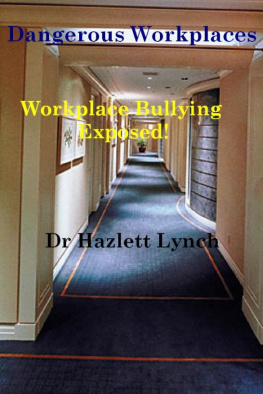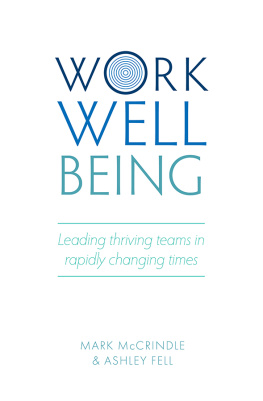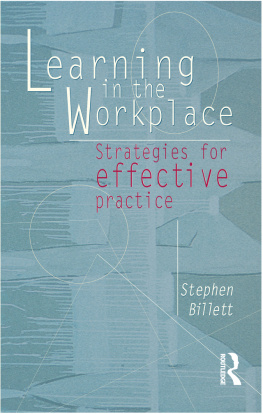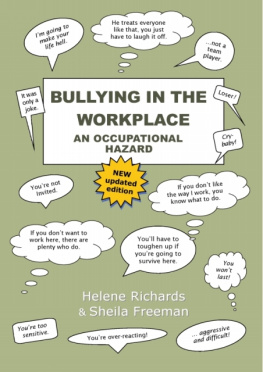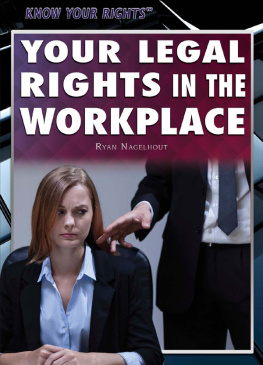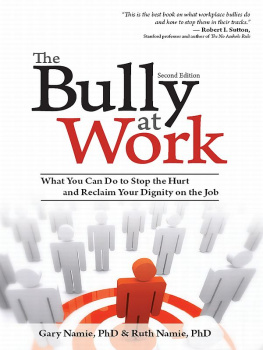Trouble at Work
Ralph Fevre, Duncan Lewis,
Amanda Robinson & Trevor Jones
BLOOMSBURY ACADEMIC
First published in 2012 by
Bloomsbury Academic
an imprint of Bloomsbury Publishing Plc
50 Bedford Square, London WC1B 3DP, UK
and
175 Fifth Avenue, New York, NY 10010, USA
Copyright Ralph Fevre, Duncan Lewis, Amanda Robinson & Trevor Jones 2012

This work is published subject to a Creative Commons Attribution Non-Commercial Licence. You may share this work for non-commercial purposes only, provided you give attribution to the copyright holder and the publisher. For permission to publish commercial versions please contact Bloomsbury Academic.
CIP records for this book are available from the British Library and the Library of Congress
ISBN 978-1-40813-703-1 (hardback)
ISBN 978-1-84966-466-0 (ebook)
Visit www.bloomsburyacademic.com to find out more about our authors and their books. You will find extracts, authors interviews, author events and you can sign up for newsletters to be the first to hear about our latest releases and special offers.
Cover image: Martin Novak/Shutterstock
Contents
Oh, how full of briers is this working-day world.
As You Like It, Act One, Scene Three
Tables and Figures
Tables
Figures
PART ONE
T his book represents the most important product of the largest, specialist research programme on ill-treatment in the workplace so far undertaken. The programme dates from 2006 when the authors began work on a funding bid to the UKs Economic and Social Research Council. The project funded by this successful bid (award number RES-062-23-312) provided the bulk of the original data which are discussed in the book. Public funds also paid for the UK Governments Fair Treatment at Work Survey (FTWS) which provided valuable supporting evidence that we cite at various points. The book therefore owes its existence to public funds but its value derives from the further, unpaid contribution of thousands of British employees who spared the time to tell us about their own experiences, no matter that they sometimes found this hard, and even distressing. It is to their stories that we turn first of all.
1
A Bad Day at the Office
A s part of the survey we discuss later in this book, people who told us they had been ill-treated at work were asked why they thought this had happened to them. We gave them options which included their age, gender and ethnicity, characteristics of the place they worked and about anyone whom they thought was responsible for the ill-treatment (see pp. 301). If none of these options fitted, they were asked to explain in their own words. A few of our respondents said it was just a bad day or that someone else was having a bad day. The best way to explain what this book is about is to tell the stories of a random selection of respondents who had experienced a bad day at work. While the facts reported, and the feelings expressed, are given verbatim, we have made up some other details in order to preserve our respondents anonymity; for example, all the names used here, and throughout the book, are pseudonyms. We have also imagined everything happened on the same bad day.
At 5.10 p.m., Suhuur, a 25-year-old Muslim woman of Pakistani origin, is collected by her mother outside the shop where she works. As she gets into the car, her mother can see she is upset and, as she eases into the traffic, her mum asks her whats wrong? You wont believe what happened today, says Suhuur, and then it all comes out in a rush: A customer asked me for something which didnt make any sense. When I went to my manager to see if she could help, the customer said a completely different thing to her than what she had said to me. We sorted out what she needed and the customer blamed me for not understanding her. How rude, says her mother, but Suhuur says thats not the worst of it. The customer said it was my fault because of my head scarf. She said to me you should unwrap that thing from around your ears so that you can hear better.
It is now 6.30 p.m. on the same day and Tanya, a 37-year-old black Caribbean woman who has a physical disability, has just arrived home from her job as a manager in local government. As she waits in the kitchen for the kettle to boil, her eldest daughter comes in: you look tired mum, she says, bad day at work? Tanya tells her that her bosses harass me as a result of not meeting the unreasonable deadlines. Her daughter is only 15 and is yet to have a job. She tells her mother its only work and not to take it to heart, but Tanya tells her she doesnt know how bad it makes you feel when you are unable to meet deadlines owing to unmanageable workloads. This makes you feel incompetent.
Half an hour after Tanya gets home, Chris rings his brother from a car rental garage in Aberdeen. Chris is white, Christian, 32 and works for an estate agent. He says, did Belinda tell you I flew to Scotland after work?, and then he tells his brother that hes expected to drive back [the] same day 11 hours driving. His brother says its ridiculous, probably illegal, but Chris says, I know, I tried to tell them its against health and safety but management took no notice, and said I could not stay at a hotel. Well at least theyve given you tomorrow off then, replies his brother. You are joking says Chris, when I said could I come in late next day? they said no; come in at your normal time.
Terry is white, Christian, born in South Africa and 36. He is meeting his friend Wayne at the pub at 8.30 p.m. and is running late, so he rings Wayne on his mobile and tells him to get the drinks in. Wayne says, it sounds like you need one, have you had a bad day at the golf course (where Terry works)? Terry says he made a mistake by cutting the wrong piece of grass. He tells Wayne his supervisor berated me about it, shouting at me, and he assaulted me; he struck me on the jaw with his fist.
By 11.30 p.m. Ramsey knows he is not going to be able to sleep for an hour or two yet. He is a 43-year-old Christian of Indian origin and he has a physical disability. He checks his Blackberry and sees his brother, who is working in Korea, is already at the office, and he sends him a message to say he has had a bad day at work. His brother will not be surprised by this he knows that Ramsey has had a long battle with his private sector employer in health and social care but has not had an update on what has happened in the past few weeks. Ramsey says, they said I had been sick for too much time; they then offered me a low daytime job which was not suitable for me. They then offered me redundancy. His brother sympathises but tells him that employers do need their employees to be available for work. This is not the point, Ramsey tells him: Staff that came after me had more sickness but no action taken against them.
Its 1 p.m. and Nandi is working at the hospital and things are going badly as usual. He is 28, of Indian origin, a Hindu and recently qualified as a doctor. He gets a five-minute break and uses it to go to the toilet and update his Facebook status on his i-phone. He wants it to be, On call patients to be seen from A & E and then sometimes only two doctors and 20 people to be seen. Employees off, either sick or study no proper cover. But he hasnt time to type all this so writes pressure and stressed instead.
It was issue that sociology could help people to fashion from their private troubles.
Examples of the successful translation of private troubles into public issues in the world of employment are easy enough to find. There have been public debates about unemployment, job security, working hours, health and safety, wages, income differentials and discrimination, for example. Unemployment was one of Millss examples, but he said that it could be far from obvious how private troubles were turned into public issues, and there might be serious disagreements about the way this was done. We are now in the middle of such a period of debate and disagreement about how best to turn the troubles at work we have just described into public issues.


